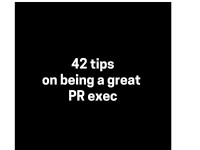- Read - PR is about telling stories, so try to read a newspaper in print or online, and your industry publications every day.
- Monitor - understand what your competitors and your industry are saying. Whether it's through Google Alerts or setting up your own dashboard using RSS feeds.
- Focus - be very targeted about what will help the business you work for achieve its goals.
- Research - understand where your audiences hang out, whether that is forums or they read certain blogs or they attend key events.
- Give - share your expertise to make the PR world a better place.
- Take - attend webinars, training and learn whenever you can.
- Listen - to your client. They should be clear about their objectives, so ensure that you listened and understand them. Also listen to journalists, if they want a landscape image, don't give them a portrait one!
- Triple-check - look out for typos, and if you don't have the time, get someone else to check your work.
- Be calm - you will be doing many things at the same time. If it's all getting too much, just breathe, walk away from your desk, and return when you feel ready.
- Be honest - if you tell the truth, people will trust you. If a lie comes out (and they often do), you look foolish.
- Accept - that the client is not always right, that you will have to work late sometimes and people will claim your ideas as their own.
- Make your client look good - whether that is a marketing manager in-house or your account director. They should repay you for it.
- De-junk your email - use colour coding or whatever you have to, otherwise you will miss things, or become overwhelmed.
- Use tools - we build our own for intelligence, but subscribe to services like Responsesource and Buzzstream too.
- Learn to write - ditch the jargon, try to use a structure for your article and blog posts and always add a call to action.
- Get social - whether you are active on Instagram, YouTube or Twitter, use these tools as you will understand how important social media is.
- Keep a track - of your work to see how you are progressing towards your targets.
- Brainstorm - get together to think of new ideas. If you work on your own, get together town other PRs and bounce ideas around.
- Take great pictures - think 300 dpi. If you don't have great lighting head outside, or better get a professional photographer.
- Meet up - with journalists, bloggers, event organisers to find out what's going on in the industry.
- Understand - the product or service you are promoting. This is especially true of technology products or services. If you don't understand an offer, how can you "sell" it?
- Pitch - be proactive and pitch ideas to journalists.
- Get evidence - always have evidence in your back pocket. Especially, if you need to write copy where you are making claims that you need to substantiate.
- Make lists - for press, bloggers, awards, analysts, events and more.
- Keep lists up to date - spend time to watch for moves, new contacts or events etc.
- Be realistic - the front page of the FT isn't possible for most companies, but understand that being in the top trade titles is a good result.
- Don't spam - sometimes you may press the send button and a message goes to the wrong person, but don't make it a habit.
- Check the publication/site - before you send a message. We run a number of blogs and are very specific about our focus, but we still get generic irrelevant news.
- Learn to juggle - you will most likely be working on a few campaigns at a time.
- Be enthusiastic - no client wants to hear someone who sounds like they don't want to work on your account.
- Come up with new ideas - bring new idea to your clients every week if you can.
- Follow - the people who want to influence. We find that LinkedIN and Twitter are good tools.
- Be brave - wacky stunts don't always work, but some do, so have a go.
- Recognise different types of copy - articles, releases, case studies and more aren't written in the exact same way.
- Create templates - if you do the same things again and again, then create templates.
- Delegate - don't do everything yourself. Hand over tasks if you can, like media monitoring, especially if there are juniors on your team.
- Prioritise - have a daily, weekly and monthly plan and work out what needs to be done now.
- Pick up the phone - introduce yourself to new journalists, or talk through an idea.
- Learn about other marketing or communications disciplines - see how activities like advertising and direct marketing tie in with PR. This is especially important around SEO - being a PR today means that you need to have a grasp of SEO too.
- Invite way more people - than you want to attend an event, as there will be dropouts.
- Deliver on your promises - if you say you will organise an interview, organise it or let the journalist know ASAP that you can't.
- Enjoy your job - PR is a great career. Our work helps to keep businesses going, brings I leads, makes customers buy, raises awareness and so much more.





